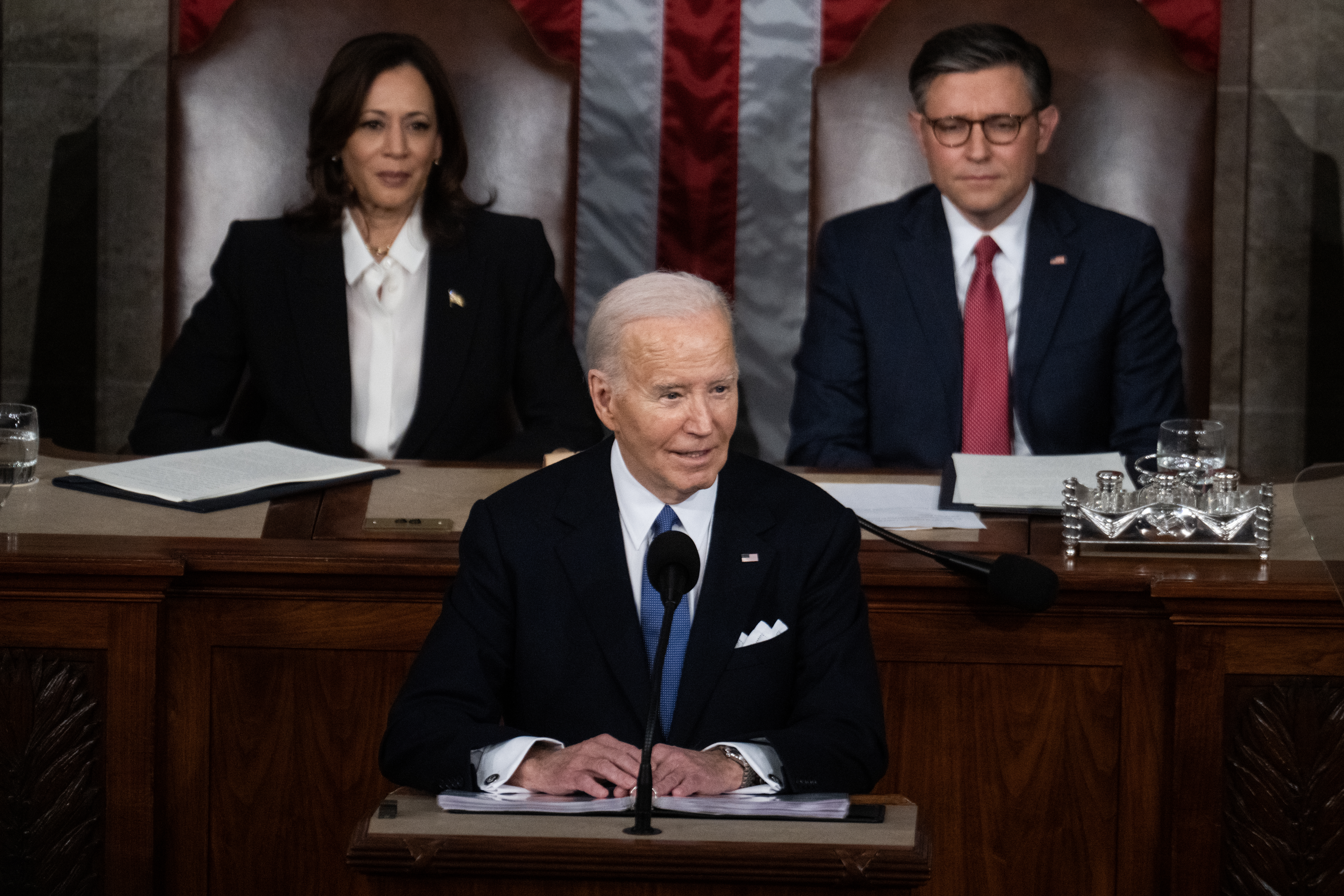US Plan To Build Port on Gaza Shores Receives Lukewarm Reception
Biden's plan for a Gaza port to ease the humanitarian crisis receives mixed reactions amid skepticism over its effectiveness and concerns about bypassing existing land crossings
US President Joe Biden announced during his State of the Union address on Thursday that Washington will build a port off the shore of the Gaza Strip to help bring in desperately needed humanitarian aid.
Gaza is on the brink of famine, facing an acute hunger crisis that officials describe as man-made, caused by limited entry points for supplies, an arduous Israeli inspection process, and Israeli attacks on aid convoys and the local police that guard them. As famine hovers over Gaza, the international community, including the US, scrambles for solutions.
The Biden Administration has been under increasing pressure to act, both from those at home and from allies abroad. As a result, the US military has conducted several airdrop missions of food and supplies into Gaza. However, the airdrop idea has drawn skepticism from some in the humanitarian community.
Biden said the port project would allow a “massive” increase in lifesaving aid to besieged Palestinians. But the details of such an operation are still vague, including where supplies could be unloaded in Gaza and who will be involved in unloading, guarding, and delivering them.
According to a US official, the plan would see aid loaded on ships in the Cyprus port city of Larnaca, some 210 nautical miles off Gaza’s Mediterranean coast. He said American officials visited Cyprus this week to examine a possible maritime aid operation.
Prof. Jonathan Rynhold of Bar-Ilan University’s Department of Political Studies told The Media Line that Biden had his own motivations behind the decision. “First of all, President Biden’s grand strategy globally is to defend the free world. Hamas, Hizbullah, and Iran are threats to that.”
“He supports Israel in its military effort, but defending the free world means he also has to fight in a manner consistent with the way the free world fights. He feels that while Hamas is largely responsible for this humanitarian tragedy, Israel is not doing everything that it can do. He is angry at those members of the Israeli government on the far right that are making it more difficult for aid to go into Gaza.”
Rynhold says Biden decided to “get rid of the excuses and bring it in himself.”
“It’s hard for the Biden Administration to pressure Israel on things that are much closer to Israeli control.”
But, surprisingly, Israelis didn’t seem to object to the US plan. Lior Haiat, a spokesman for Israel’s Foreign Affairs Ministry, said the country “welcomes the inauguration of the maritime corridor from Cyprus to the Gaza Strip.”
For Palestinians, Biden’s decision to establish a maritime aid corridor to battered Gaza, including constructing a temporary port and aid deliveries from Cyprus, was received with a great deal of skepticism among Palestinians.
Ahmad Rafiq Awad, a professor at Al-Quds University, told The Media Line he’s puzzled by Biden’s plan, given that there are seven ground crossings between Israel and Gaza and another between Egypt and the Palestinian enclave.
“It makes no sense to me whatsoever. Are you telling me the superpower country America can’t pressure Israel to open the crossings for humanitarian purposes?”
Awad argues that will give credence to the belief that Israel is, in fact, in control and not the US. He says, as it is, Palestinians don’t view the US as an “honest broker.”
“The US left many questions unanswered on whether there will be a role for Hamas to protect the aid coming in or for the UNRWA to distribute the aid,” said Awad.
About 85% of Gazans have been displaced by the Israeli onslaught amid acute shortages of food, clean water, and medicine. Additionally, 60% of the enclave’s infrastructure has been damaged or destroyed, according to the UN.
Awad says that the US airdropping aid over Gaza is “nothing more than a Hollywood movie in which the American is the humanitarian hero.” He adds that if the US has good intentions, it will force Israel to allow the humanitarian trucks sitting idle at the Rafah crossing to enter. “More than two thousand aid trucks waiting to enter Gaza, sufficient for the Palestinians there for several weeks,” said Awad.
Awad says what causes suspicion and doubt about the US efforts is that the Americans are carrying out these operations without directly and on a large scale communicating with UNRWA, which has the experience, staff, and ability to deliver aid to almost everyone.
Egyptian President Abdel Fattah al-Sisi said on Saturday that the reconstruction of the Gaza Strip, adjacent to the border with his country, will require $90 billion.
In a speech at the Cairo Convention Center, Sisi said he “requested an estimate (from Egyptian state institutions) for the cost of rebuilding the Gaza Strip as a result of the Israeli bombing it witnessed,” stressing that it “needs 90 billion dollars,” according to the Cairo News Channel.
He pointed out that “what happened in Gaza is challenging for Egypt and the entire region.”
Egypt and the United Arab Emirates carried out a fifth joint airdrop humanitarian aid mission on Friday for Palestinians in the war-torn Gaza Strip, according to the Emirati news agency WAM.
For more than a week, Arab countries, namely Egypt, the Emirates, Jordan, Qatar, Oman, and Bahrain, have continued to carry out joint operations to drop food aid in Gaza, in addition to similar operations by the US.
“The Rafah crossing is open 24/7, and we are keen to bring aid into the Gaza Strip,” he added. He also noted that Egypt “airdrops aid into the Gaza Strip because of the difficulties facing the process of bringing it in by land.”


